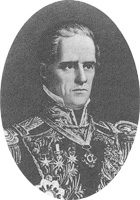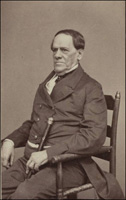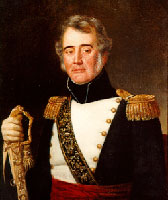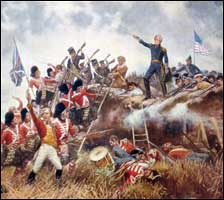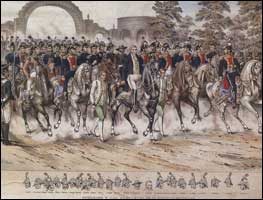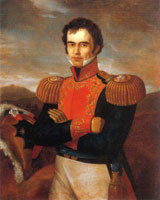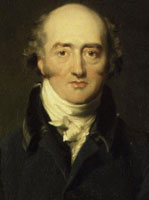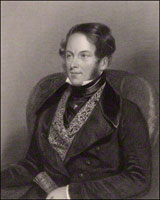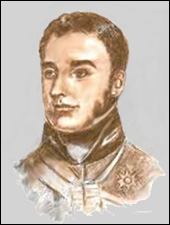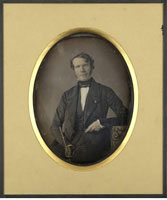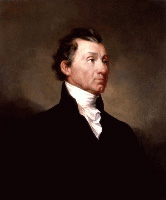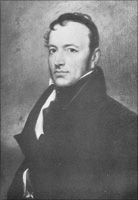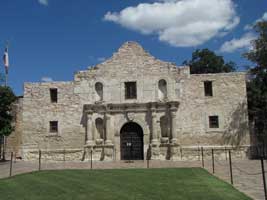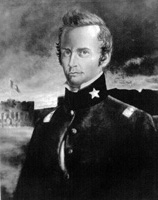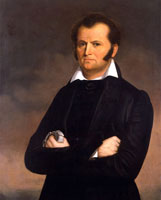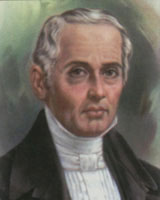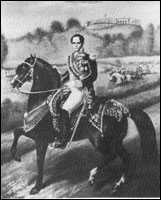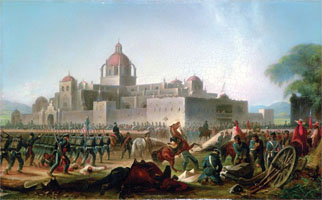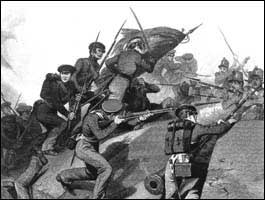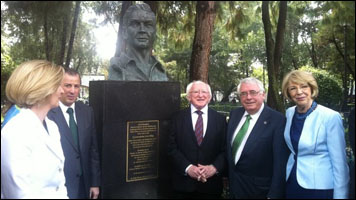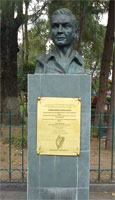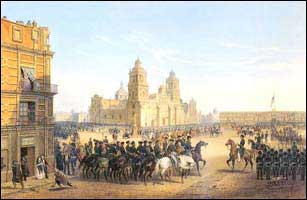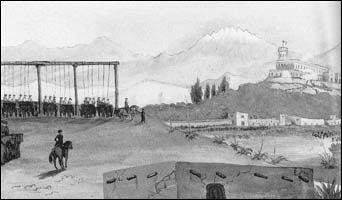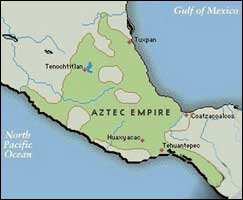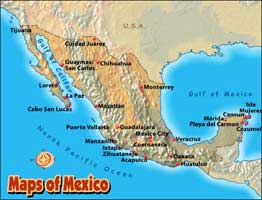After
independence, Mexico's "manifest destiny" lay to the
South but it was blocked when Canning (cunning) |
According to the Holy Bible, ALL empires are BEASTS, and in this expose we will see the British Empire at her most BEASTLY . . . and CUNNING!!
General Santa Anna was 6 times President of the Mexican Republic. He led 2 expeditions into Texas, the second one resulted in the butchery at the Alamo and Goliad. He commanded British-Mexican forces during the "Mexican"-American War.
|
His long career proved the maxim that Britain always takes good care of their faithful secret service agents. If Santa Anna had never existed . . . he would have to be invented . . . and here is the reason why!!
British strategy shifted to Mexico after their defeat at New Orleans!!
The War of 1812 was all about blocking the new nation from expanding past the mighty Mississippi River. Sir Edward Pakenham was supposed to be the new governor of the Louisiana Territory.
|
Pakenham was the brother-in-law of the Duke of Wellington. His body was preserved in a rum casket and shipped back to Ireland for burial.
Immediately, the British government focused all their attention on Mexico. If the U.S. could not be stopped at the Mississippi River, they would set up a new defensive line in Oregon and California.
Following the example of the United States, Mexico fought a bloody war to gain independence from Spain. Finally, in 1821, independence was declared and Mexico cast off the yoke of imperial Spain....Except for claiming imperial Spain's former territories.
|
In 1827, this enlightened ruler decreed the expulsion of all Spaniards from the Republic. The Spaniards, with encouragement from the British, were constantly plotting to overthrow the democratically elected President and Congress.
President Guadalupe wanted to end every vestige of imperial Spain, but he was persuaded to claim all the lands west of the Mississippi River, which were part of the now defunct Spanish New World empire.
Canning (cunning), Ward, and Pakenham recruited Santa Anna as a spy!!
George Canning (cunning) was British foreign secretary from 1822 to 1827. He HATED the new U.S. Republic with a passion. He dispatched his top spy, Henry George Ward, under the guise of a "diplomatic mission" to counter U.S. influence in the new Republic.
Ward was instructed to counter U.S. influence in Mexico no matter what the cost.
No expense was spared by the British government to gain influence with the new President. Bribery, women, everything was on the table and nothing was prohibited
|
Spain's only claim to that vast wilderness was the Papal grant of 1493. When France was expelled from the New World with the help of the colonials, Britain double-crossed the colonials by giving Spain all the lands west of the Mississippi River, and prohibiting her New World subjects from settling west of the Appalachian Mountains.
To increase the zeal and anti-U.S. fervor of Ward, Cunning sent the brother of Sir Edward Pakenham to Mexico.
|
|
The French and British were bitter rivals but they found it absolutely necessary to work together to block the expansion of the United States:
These accusations contained just enough truth in them to prove an embarrassment. Gros and the British chargé d'affaires, Richard Pakenham, admitted that most foreigners welcomed the revolution in the belief that they would fare better if the conservatives were evicted from office. Santa Anna, principal military motor of the revolt, operating from his base in Manga de Clavo near Veracruz, had undeniably attracted the open support of many French subjects. Carrére was his personal friend and was suspected by Gros of stepping outside the path of official neutrality. Of the foreigners who had enrolled in his army, some twenty were French. Gros assured Alamán that by taking up arms these French had deprived themselves of the protection of their legation. Unmollified, Alamán replied that if the French in Veracruz did not wish to come to harm during the conflict, they had best remove themselves from the country. Finally, Gros was additionally embarrassed by the conduct of the French navy, which had chosen this moment to make another of its unpredictable appearances off Veracruz. In addition to the man-of-war Héroine, on which Gros had arrived in February, a corvette and a brig were patrolling offshore and were naturally objects of suspicion. (Barker, The French Experience in Mexico, 1821-1861, pp. 43-44).
In 1838, a war broke out between France and Mexico called the Pastry War, and during the conflict, Santa Anna lost a leg. Exploiting his wounds with eloquent propaganda, Santa Anna catapulted back to power.
Joel Poinsett tried to counter British spying in Mexico!!
By urging President Victoria to claim the lands of the defunct Spanish empire, Cunning knew that this would eventually mean war with the United States because the original charters of Massachusetts and Virginia reached to the South Sea or Pacific Ocean.
|
The British were working on a special treaty that would allow them favored nation trading rights with all the new South American Republics to the exclusion of the United States. Poinsett would not agree to the treaty:
Ward himself did not refer to this when reporting that meeting to Canning. He simply said that Poinsett had been very disturbed to learn of Ball's departure for England, assuming it was `connected with the differences of opinion which existed between [them]'. Poinsett, according to Ward, explained that he had not himself created the masonic 'junta' but had 'been almost forced into it'. He had not made use of it for political purposes, although he did not deny that he thought it useful for acquiring influence. He had never tried to persuade the Mexicans against alliance with Europe, but 'as a good American' he had `naturally endeavoured to inspire them with feelings of a still more amicable nature towards his own country'. This did not persuade Ward to change his personal view of Poinsett, but he told him that he accepted this explanation that his hostility to England and Europe was not personal, and that he only wanted fair commercial competition. While assuring Poinsett of his continued personal friendship, he emphasized that the 'junta' was dangerous to the interests of Britain. But Poinsett maintained his view that the existence of the clause in the British treaty allowing special trading privileges between the Spanish-American countries meant that they would become separate from the rest of the continent, which was something to which he would never consent. He was very disturbed to learn that Ward had withdrawn his note objecting to this clause. (Johnston, Missions to Mexico, p. 181).
At that time in Mexico, if you didn't bow down when the host or Jesus cookie passed in the street, it could mean a death sentence:
Poinsett was also struck by the eternal manifestations of religious devotion, of which he presented two vivid illustrations "The shops were filled with tradesmen and purchasers. Under the porticoes were men and women selling fruits and flowers, and wax-work representing ... the costumes of the country....Leperos [lepers?] were leaning against the columns sunning themselves; and beggars and little urchins selling pamphlets and gazettes followed us with loud clamours. In the midst of this scene of noise and confusion, I observed two women on their knees before the picture of the Virgin....They were abstracted from all that was passing around them, and appeared to be really and devoutly absorbed in prayer....The tinkling of a small bell was heard. It announced the passage of the Host from the cathedral to the death-bed of a sinner. In an instant all was still. Shopkeepers and their customers, leperos and noisy children, all doffed their hats and knelt on the pavement, where they remained until the Host was out of sight, devoutly crossing themselves the while." And again: "We heard the clock strike twelve; every one stopped, pulled off his hat and prayed a short prayer or was supposed to do so. The solemn stillness that succeeded the bustle of a crowded street at this moment is very striking....In most Catholic countries this ceremony is observed at the hours of vespers ... but this is the first place where I have seen the people generally pray at noon. ( Rippy, Joel R. Poinsett, Versatile American, pp. 95-96).
Pointsett didn't say if he bowed down. but if he didn't, only his diplomatic status saved his life.
Thanks to the intrigues of Cunning, Ward, and Pakenham, Joel Poinsett was recalled from Mexico in 1830. This just happened to coincide with the rise to power of British spy Santa Anna.
Remember the Alamo?
After the Louisiana Purchase, United States pioneers felt an irresistible urge to occupy all the lands from the mighty Mississippi River to the Pacific Ocean. Unfortunately, the British spies in Mexico urged President Guadalupe Victoria to lay claim to this vast wilderness . . . which was never a part of the Aztec nation....Very few Mexicans dared to venture there because the Apaches and Comanches loved to collect Mexican scalps.
Soon the U.S. pioneers were the majority in Texas, and they saw no reason to be subjects of the government in far off Mexico City. Strange as it may seem, British spies in Washington City urged the westward expansion to Texas because it would be a casus belli for war between Mexico and the U.S.
In January 1836, dictator Santa Anna marched north with about 6,000 soldiers determined to bring Texas under Mexican control. By the end of February, he had the Alamo invested with about 2,000 of his remaining men who had not died on the long march.
|
The Mexican army was armed with .753 caliber British 'Brown Bess' muskets and Baker .61 rifles. Their siege cannon was also made in Britain.
|
The defeat at the Alamo did serve its purpose of buying time for general Sam Houston and his Texas forces. Houston and his soldiers defeated Santa Anna's much larger army at the Battle of San Jacinto on April 21, 1836, with the Texans shouting "Remember Goliad, Remember the Alamo!" The day after the battle, a small Texan force led by James Sylvester captured Santa Anna. They found the general dressed in a dragoon private's uniform and hiding in a marsh.
Santa Anna was able to escape a firing squad because of the timely intervention of his British masters. He commanded the Mexican forces during the last year of the Mexican-U.S. War.
Santa Anna and his British San Patricio Battalion!!
In August 1846, Santa Anna returned from exile in Havana. He proceeded immediately to Mexico City. By that time the British controlled all the silver mines of Mexico, so with the help of British ambassador Charles Bankhead, he was "elected" President, with Gómez Farías as his Vice President.
|
In 1843, sergeant John Riley "deserted" from the British Army in Canada and crossed the undefended border into Michigan. In September 1845, he enlisted in the United States Army and took the oath of allegiance to this country.
Riley knew that war between Mexico and the U.S. was imminent. Just 2 weeks before the war started, he was stationed at the Rio Grande, opposite the Mexican town of Metamoros. That was when he deserted the U.S. Army and took about 200 fellow Judases with him.
Riley was promoted to major in the Mexican Army and his prior combat experience with the the British Army caused heavy casualties among his former "comrades" in the U.S. Army.
About 200 deserters from the U.S. Army made a final stand in the San Mateo Convent in Churubusco. Just under 80 of the traitors surrendered, including major Riley.
|
Riley knew that his position as a British spy would save him from the hangman's noose . . . so he surrendered . . . and escaped the death of a traitor!!
|
There is no date on the plaque showing the birth or death of Riley. Most people believe that he was born in 1817, but it is certain that he returned to Canada in 1850, and rejoined his regiment there.
No image of Judas Riley exists so they made him look like the Irish actor Pierce Brosnan.
General Scott entered Mexico City in triumph!!
General Scott and his small army of just over 6,000 men entered Mexico City in triumph on September 14, 1847. The British Squadron off the coast of California was eagerly awaiting the final outcome of the war, and Admiral Seymour was bitterly disappointed.
|
It is certain that when Judas Riley finally met his Maker, the real Saint Patrick was first in line to throw him into HADES, for disgracing the name of Hibernia's patron saint!!
The great victory of general Scott and his small army was marred by the hanging of the deserters. British propaganda began to circulate among the huge number of Irish immigrants stating that the hangings were motivated by religious prejudice. After the peace treaty was signed, and the U.S. fulfilled its Manifest Destiny by extending from sea to shining sea, the sore losers in Mexico and the U.S. began to gripe that Mexico lost half of its territory!
Here is the typical view of "academia" in the U.S. today, found in a book by John S.D. Eisehnower–son of former President Eisenhower:
By all logic, then, both nations would have been better served if those boundary changes could have been effected by a purchase, negotiated without fighting. But even though she had virtually lost all control over New Mexico and California, Mexico could never have relinquished territory without a fight. For such a transfer would not have been the result of a voluntary agreement like the Louisiana Purchase of 1803; it would have resembled the Eighteenth-Century partition of Poland or the consequence of the notorious Munich agreement of 1938. Few people, certainly not the proud Mexicans, would ever entertain offers to purchase parts of their countries; though it cost Mexico dearly to resist, it is to her credit that she did. (Eisenhower, So Far From God: The U.S. War With Mexico 1846–1848, p. 370).
This is the same Eisenhower whose father led a crusade in Europe against Germany while the British were spying on him (Kay Summersby) and laughing their heads off in Canada.
|
After independence from Spain, Mexico's "manifest destiny" lay to the South but she was blocked because the British Empire wanted control of the silver mines. This led to the creation of many smaller states and the old British Empire divide and conquer strategy.
No sane person today believes that Pope Alexander VI–one of the most corrupt men that ever lived–had authority to give away any part of the New World to Spain . . . or any other country!!
References
Barker, Nancy Nichols. The French Experience in Mexico, 1821–1861. University of North Carolina Press, Chapel Hill, 1979.
Bauer, Jack K. The Mexican War 1846–1848. University of Nebraska Press, Lincoln & London, 1974.
Eisenhower, John S.D. So Far From God: The U.S. War With Mexico 1846–1848. Random House, New York, 1989.
Eisenhower, John S.D. Agent of Destiny: The Life and Times of General Winfield Scott, The Free Press, New York, 1997.
Dixon, Peter. George Canning: Politician and Statesman. Mason/Charter Publications, New York, 1976.
Fowler, Will. Santa Anna of Mexico. University of Nebraska Press, Lincoln & London, 2007.
Johnson, Timothy D. A Gallant Little Army: The Mexico City Campaign. University Press of Kansas City, 2007.
Miller, Robert Ryal.Shamrock and Sword. The Saint Patrick's Battalion in the U.S.-Mexican War. University of Oklahoma Press, OK. 1989.
Rippy, Fred J. Joel R. Poinsett, Versatile American. Duke University Press, Durham, North Carolina, 1935.
Copyright © 2017 by Patrick Scrivener
